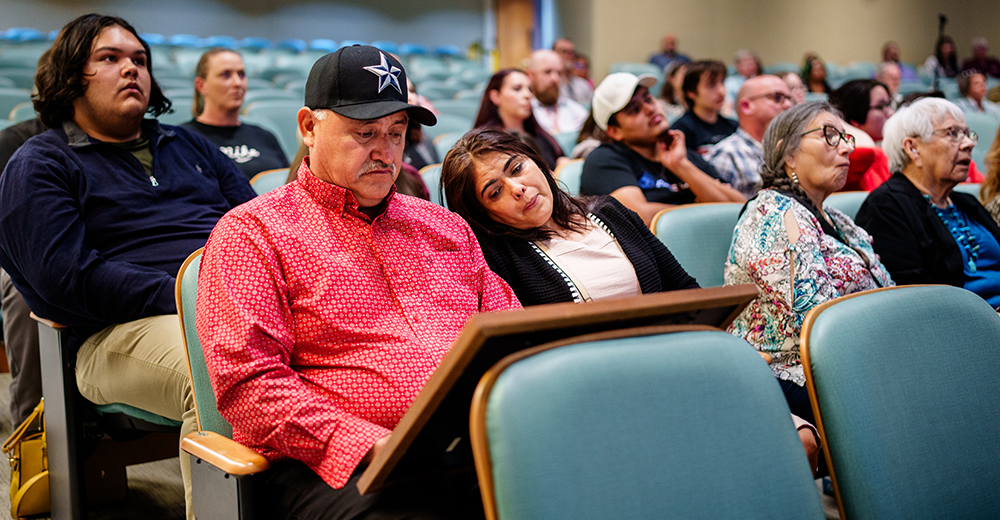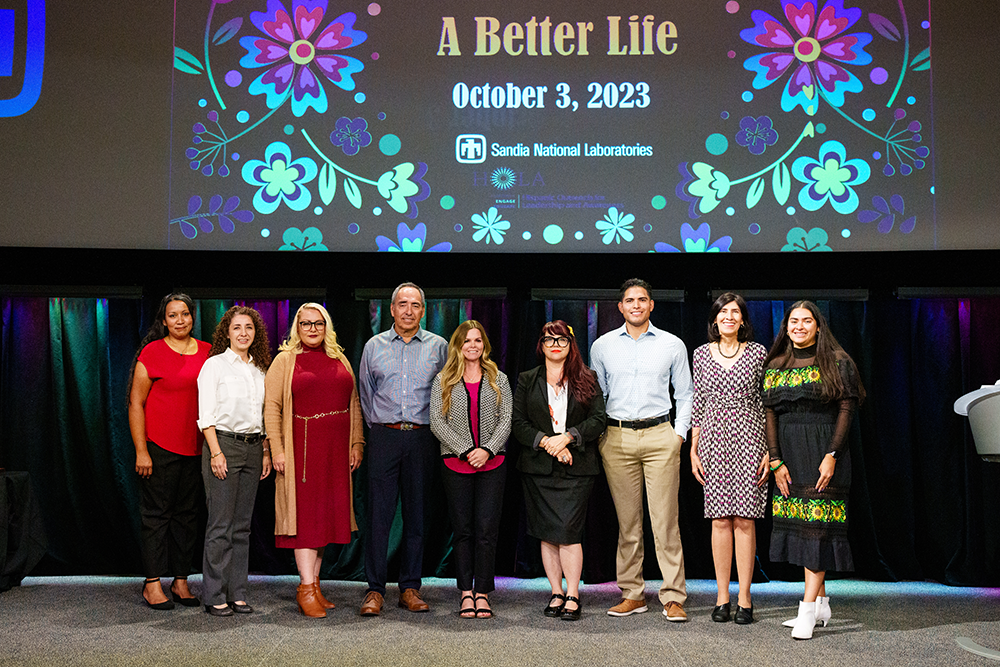
(Photo by Craig Fritz)
Five Sandians took the stage earlier this month to share their journeys to become the first in their family to earn a college degree.
The event was organized by the Hispanic Outreach for Leadership and Awareness employee resource group to commemorate Hispanic Heritage Month.
Each story was different, but all demonstrated the courage to carve a new path, a connection to someone who believed in them and a mindset driven by their purpose to create a better life.
Amanda Vital
Amanda grew up with a little voice in her head reminding her that she can go farther.
“Mija, get your education.” The voice is her father’s.
Her father, Francisco Javier Vital, came to the United States from Guadalajara, Mexico, in the 1970s. He started his own roofing business in Albuquerque, but as an immigrant living in the U.S., he faced harsh racism and discrimination.
“Here, he was just a poor immigrant, an illegal alien,” Amanda said.
But not to Amanda. To her, he was a superhero.
Still, as parents do, he wanted more for his young daughter, and pushed her, his Mija, to get her education.
At 15, Amanda’s life took a detour, and she suddenly had a Mija of her own. But Amanda stayed the course, graduated on time, with honors and a toddler.
“I didn’t think I deserved to go to college,” Amanda explains. “I didn’t know anyone that went to college other than my teachers … that was a life that was foreign to me. I didn’t think I was smart enough.”
Five years after graduating high school and led by her father’s voice, Amanda stepped onto the campus of Central New Mexico Community College, walked away with a course schedule, and proved herself wrong.
Amanda graduated from CNM with her associate degree and fell in love with higher education. She took a job at the college helping other first-generation students pursue their education and eventually, encouraged her own mother to get her associate degree.
Amanda started classes at the University of New Mexico but by that time she had three children and was working full-time at CNM. It was just too much, and Amanda dropped out.
“In 2018, I watched as cancer ravaged my father’s body and eventually took him from us,” Amanda recalls. “Even amongst the cloud of grief I was in, I heard my dad’s voice, ‘Mija, get your education,’ so that summer… I walked back onto the UNM campus.”
Amanda left with a success plan and a new course schedule. She graduated in December 2020 with a Bachelor of Science degree in tech and training and another BS in communications.
On graduation day Amanda put on her cap and gown, drove to the cemetery, knelt by her father’s gravestone and told him, “Pa, I got my education.”
Today, Amanda works as an information management professional with Sandia’s Mission Assurance team.
David Castillo

David’s sixth grade teacher wrote a note on his report card that read, “I’m sorry to report but David does not take his schoolwork seriously.”
She wasn’t wrong.
A self-described “impressionable follower,” David said he spent high school avoiding as much work as possible and ditching classes. In 1979, he graduated with a 1.86 grade point average.
That summer David moved with his family to Albuquerque where he got a job flipping burgers at Blake’s, but after seeing his first paycheck, he realized he might need something more.
“I went to Winrock Mall and wandered into the H. Cook Sporting Goods store and noticed a ‘Help Wanted’ sign in the ski department,” David said.
He applied, got the job and a new group of coworkers and friends, who made a new impression on him. This time it was to further his education.
David enrolled at UNM where many of his co-workers were full-time students. However, after struggling with the freshman curriculum he reassessed his situation. David applied and was accepted into the Laser Electro-Optics Program at Albuquerque’s Technical Vocational Institute. This opportunity helped him get a job at Sandia’s Radiation Hardened Integrated Circuit Facility, or RHIC-1. From there, he would go on to earn his associate degree in applied science, nearly doubling his high school GPA, graduating with a 3.67.
At that time there were increasing opportunities in hazardous waste and David’s work at RHIC-1 would soon morph into his career.
In 1993, David was hired as a technologist in Sandia’s Waste Management Department and in 1998 he was promoted as a distinguished technologist. Today David is a senior member of the technical staff with the Labs Environmental Systems Department.
Amanda Hebert
Amanda and her twin sister were just 16 years old when they left home, two years older than their mom was when the girls were born.
Her parents spent much of her childhood in active addiction, a cycle Amanda was determined to break.
Amanda and her sister attended a work study program during their junior year of high school where they met Elaine.
“Elaine would end up being a stand-in mother for my sister and I, and a big inspiration for me in continuing my education,” Amanda said.
The twins would become the first in their family to graduate high school and college.
Amanda joined the Army National Guard during undergrad to help pay for school and after taking a break in 2010 for a tour of duty in Afghanistan, she graduated in 2013 with a Bachelor of Science in environmental health.
She moved to Albuquerque with her daughter after graduation to work at Sandia. In 2019, Amanda would become the first in her family to earn a master’s degree. Today, Amanda is an engineering program and project lead with the Labs Safety and Health Engineering I group.
Amanda Hawkins
The Adverse Childhood Experience study measures the level of childhood trauma experienced based on 10 risk factors. Amanda scored a 9/10.
Growing up, Amanda and her five siblings often went without food, basic utilities and at times, a home.
An elementary school teacher told Amanda that based on her background, she would likely never go to college. But her high school principal saw Amanda’s potential and helped her get a summer internship with the United States Department of Agriculture’s Forest Service.
She was on track to graduate until her junior year until her mother pulled her out of school to help take care of the family. However, a classmate’s parents encouraged her to continue with her education.
Amanda listened and would end up being the first in her family to graduate both high school and college.
A college internship at the Labs introduced Amanda to what would soon become her career. Today, she is a quality engineer with the Component Science, Engineering and Production Center.
“Sandia changed my life,” Amanda said.
Manuel “Manny” Serrano
Manny’s parents, Juan Manuel and Rita, were both forced to drop out of school when they were in elementary school. Growing up in Mexico, the two left school to help support their families.
Years later the two would meet, fall in love, marry and in 1994 on Independence Day, immigrate to the United States.
The couple settled in Hatch, New Mexico, where they worked long hours picking chile and onions.
“Despite my parents not having a formal education, they always encouraged me and pushed the importance of education,” Manny said.
Manny would eventually become the first in his family to not only graduate primary school, but high school, college and on the 29th anniversary of his parents coming to the U.S., Manny would the first in his family to earn his doctorate.
Manny is a systems engineer working with the W76-1 Systems Life Extension group.